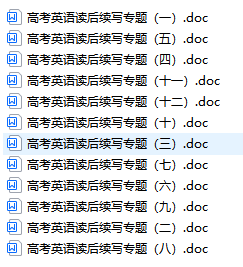新高考英语读后续写专题指导+练习(12份,65页,Word版)下载

高考英语读后续写专题(一).doc
高考英语读后续写专题(五).doc
高考英语读后续写专题(四).doc
高考英语读后续写专题(十一).doc
高考英语读后续写专题(十二).doc
高考英语读后续写专题(十).doc
高考英语读后续写专题(三).doc
高考英语读后续写专题(七).doc
高考英语读后续写专题(六).doc
高考英语读后续写专题(九).doc
高考英语读后续写专题(二).doc
高考英语读后续写专题(八).doc
下面为部分内容展示,完整版请下载word文档
高考英语读后续写专题(一)
一:典题技法指导
In a certain store where they sell puddings, a number of these delicious things are laid out in a row during the Christmas season. Here you may select the one which is most to your taste, and you are even allowed to sample them before coming to a decision.
I have often wondered whether some people, who had no intention of making a purchase, would take advantage of this privilege. One day I asked this question to the shop girl, and I learned it was indeed the case.
“Now there’s one old gentleman, for instance,” she told me, “he comes here almost every week and samples each one of the puddings, though he never buys anything, and I suspect he never will. I remember him from last year before that, too. Well, let him come if he wants it, and welcome to it.”
She was still speaking when an elderly gentleman limped (跛行) up to the counter and began looking closely at the row of puddings with great interest.
“Why, that's the very gentleman I’ve been telling you about,” whispered the shop girl. “Just watch him now.” And then turning to him: “Would you like to sample them, sir? Here's spoon for you to use.”
The elderly gentleman, who was poorly but neatly dressed, accepted the spoon and began eagerly to sample one after another of the puddings, only braking off occasionally to wipe his red eyes with a large torn handkerchief.
“This is quite good.”
“This is not bad either, but a little too heavy.”
All the time it was quite evident that he sincerely believed that he might eventually buy one of these puddings, and I am positive that he did not for a moment feel that he was in any way cheating the store. Poor old chap! Probably he had come down in the world and this sampling was all that was left him from the time when he could afford to come and select his favorite pudding.
注意:
1.所续写短文的词数应为150左右;
2.至少使用5个短文中标有下划线的关键词语;
3.续写部分分为两段, 每段的开头语已为你写好;
4.续写完成后, 请用下划线标出你所使用的关键词语。
Paragraph 1:
In a burst of benevolence(善举), I went up to him and said:“Pardon me, sir, would you mind me purchasing you one of these puddings?”
Paragraph 2:
The girl started to make a parcel of it, while he pulled out a worn little black pocketbook.
一、文章的人物分析
I, the gentleman, the shop girl
搞清楚每个人的性格特点:
I: kind
The gentleman: lovely, kind
The shop girl: kind
二、立意
立意的分析是要结合两段的开头,第二段续写开头说老人自己掏出钱包,说明他拒绝了我的好意,同时结合每次他都是免费品尝布丁,可以推测老人意识到别人可能看不起他的这种行为了,这就是文章的主题:自尊的伤害。
三、如何行文
任何记叙文的续写千万不要把情节搞得太复杂,3-5句把续写主要情节构思说清楚。这是因为:高考的读后续写的一个重要评分指标就是看细节描写。细节描写包括:动态的和静态的。前者主要是动作描写;后者主要是环境和心理描写。表面上是3-5句构思,实际上每一句都伴随细节描写的铺垫2-3句,这样下来整个文章就是15句左右了。
切记:高考应试作文是要看你是不是具备细节描写的功底,有一些同学标新立异,全部是大段对话。很多时候,大段对话只是为了掩盖自己的语言的贫瘠。
四、提纲
读后续写必须写提纲,否则卷面最后涂改得非常可观。
Para 1: (细节:老人的尴尬和生气; 我的后悔和羞愧) He declined and picked out the best puddings.
Para 2:
He gave the money to the shopping girl.
He left the store.
只有三句话,无非就是:老人拒绝,老人自己付钱,老人离开再也没有来了。读后续写的立意充分体现在第二段中。考生应该充分发挥想象力,脑补画面感。老人如何把钱拿出来?他很穷。此时孔乙己的形象跃然纸上,最好是一文文钱排出来,凸显老人的绅士风度,同时给人无限的同情心。
一个人在最穷困潦倒时还要坚持品尝布丁,享受那么一丁点的快乐,却被我给剥夺了。
Para. 1:
In a burst of benevolence(好心), I went up to him and said:"Pardon me, sir, would you mind me purchasing you one of these puddings?" With that, (对方的反应:尴尬和生气) I saw the blood rushed to his face as if he had been stung. (我的旁白解释) Obviously, my words pierced his heart. (动作描写)He shivered, rubbing his hands together fiercely. (开始说话了) Noticing that the whole world was watching him, he stumbled, “Excuse me, sir, you must have mistaken me for someone else.” (我的反应:后悔) Just then, a ripple of regret welled up inside me. (主要对话)“Please show me these puddings,” he turned to the shop girl and said with determination, pointing to the best puddings.
Para. 2:
The girl started to make a parcel of it, while he pulled out a worn little black pocketbook. (接下来的动作描写要伴随心理活动:怎么拿出钱;怎么放钱)The gentleman began to fumble about in the pocketbook for coins, an expression of seriousness on his face. He placed the coins on the counter so gracefully and carefully one by one. His chin rose in a proud gesture after doing it. (我的心理活动) I was so overwhelmed by my guilt and shame. How I wished I could unsay the foolish words! (目送)Then all of us watched him stagger to the door and leave silently. Never have I seen him go there to sample the puddings any more.
五:成文
In a burst of benevolence, I went up to him and said:"Pardon me, sir, would you mind me purchasing you one of these puddings?" He jumped back as if he had been stung, and the blood rushed into his wrinkled face. "Excuse me," he said, with more dignity than I would have thought possible, "Undoubtedly you have mistaken me for someone else." And with a quick decision he turned to the shop girl and said in a loud voice, "Kindly pack me up this one here." He pointed at one of the largest and most expensive of the puddings.
The girl started to make a parcel of it, while he pulled out a worn little black pocketbook. He began counting out shillings and pennies on to the counter. How I longed for the power to unsay my tactless words! It was too late though, and I felt that the kindest thing I could do now would be walk away. "You pay at the desk," the shop girl was telling him, but he did not seem to understand and kept trying to put the coins into her hand. And that was the last I heard of or saw of the old man. Now he can never go there to sample pudding any more.
